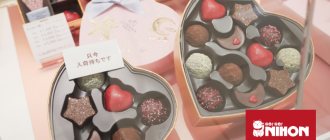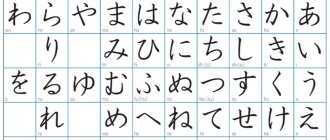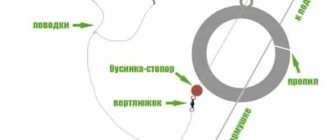"Good evening" in Japanese
こんばんは – (Konbanwa)
Both Russian and Japanese have a special phrase for greeting an acquaintance in the evening. Sounds like "Konbanwa". Residents of the Land of the Rising Sun use it after 16 hours. The phrase is respectful, appropriate in communication with equals and elders.
When meeting after 4 pm, the Japanese greet each other with the remark "Konbanwa"
[edit] Mentions, desu
| « | The burden of cultural expansion is heavy. // I just don’t walk around like that. If someone suddenly says “sage”, then millions will answer “DESU” | » |
| - oal | ||
| « | I drove desu through desu Sees desu - desu desu Put desu desu in desu Desu desu desu desu! | » |
| — Anonymous | ||
| « | Desu desu, bitches! | » |
| — Judai Yuuki from TAS | ||
- Desu was often used by Yukari from the anime Rosario + Vampire
, Sabato from
Bokusatsu Tenshi Dokuro-chan
, Furude Rika from VN
Higurashi no Naku Koro ni
, Yuri Cube from
Galaxy Fraulein Yuna
, Sumomo from
Chobits
and Minetta from
Shukufuku no Campanella
, desu. - Also, this linguistic construction is regularly used by the alien frog invader and part-time kawaii cretin Private Tamama from Sergeant Keroro
, pronouncing it in an inimitable squeaky voice, desu. - Desu is said during attacks by Dark Sakura from the game Crucis Fatal Fake
, created based on
Fate/stay night
, desu. - デスノート (desu nōto) is a phonetic transliteration of the Japanese katakana syllabary of the phrase “death note” - the name of the shonen anime series Death Note
, desu. In general, デス is the katakana notation of the English word for “death,” desu. - Sometimes desu can be represented as an interjection or the word "fuck", desu. For example, there is citation 401237 on Bashorg, which clearly demonstrates the use of desu in this context:
| xxx: what is desu? yyy: desu is a prefix to a phrase that means nothing. something like “..., fuck”, only kawaii yyy: guys, who’s the last one for beer, desu? |
- DESU is the nickname and at the same time catch phrase of the anime character Rozen Maiden
Suiseiseki, desu. - Shijou Saikyou no Deshi Kenichi
- the main character’s girlfriend added “desu wa”, desu, to the end of almost any phrase. - Wilhelmina Carmel from the anime Shakugan no Shana
adds "de arimasu" (a variant of desu, used mostly only in fiction) to the end of any phrase, desu. - Sanae Dekomori from the anime Chuunibyou Demo Koi ga Shitai!
accentuatedly inserts desu at the end of any phrase, even where it seems like it shouldn’t be, desu. Sometimes he uses desu without unnecessary words as an interjection, desu. - Caramel from the anime "The Great Pastry Chef" also often uses this word, desu.
- Tachibana Sylfinford from Himouto!
Umaru-chan uses “desu wa” to put moral pressure on her opponents, which is kind of her trick. She even has a song consisting of "desu wa", more than half desu.
"Hey dude" in Japanese
Informal communication is typical for young people. The informal Japanese greeting "Yahoo" is common. It appeared in the Osaka dialect and gradually spread throughout the country. This word is universal, but is used more by girls. Guys prefer the shortened version "Yo".
Some slang phrases are used only by guys, others only by girls
"Good morning" in Japanese
おはようございます – (Ohayōgozaimasu)
Any phrasebook begins with greeting phrases that depend on the time of day. Daytime and universal option – konnichiwa; but he's not the only one.
Ohaiyo gozaimas is the most polite version of the morning greeting. When communicating with a loved one, they use only the first part of the replica, omitting the verb gozaimas, symbolizing a respectful attitude. The “Good morning” response is appropriate in the first half of the day.
Ohaiyo - morning greeting in the Land of the Rising Sun
[edit] Options, desu
Watashi wa neko desu! This is a fucking Desu... There were Desu in the USSR too
- DESU is a diesel-electric power plant. Engineers are familiar with this.
- desu is an outdated name for women's underwear.
- Nanodesu
is a desu that serves to explain the cause, nanodesu. - Yes
,
de gozaimasu
are less and more polite options, respectively. See Use, desu. - DES-x
is the ODM version of desu - the general name of the 100-megabit series of switches produced by D-Link, which are used by 95% of serious businesses, desu. [
SHIETO?
] “Desu is dead”, “Plug the patch cord into desu”, “New firmware has appeared on desu”, desu. DES-X is also a variation of the DES encryption algorithm proposed by Ronald Rivest (which is the R in RSA). - -с
(
-съ
,
slovors
) is a good analogue of “desu” from the Russian language of the 19th century and earlier.
“Excuse me, sir, we don’t know where the master is,” “...we know General Epanchin, sir, actually because he is a well-known person...” Not everyone knows, but this postfix was formed from the reduced -su
(“Use for you, boyar-su"), that is, almost
-desu
, desu.
And it was even used in a similar way: “I-su went,” “I didn’t understand the devil.” “Su,” in turn, came from the polite address “sir,” that is, a truncated “sovereign,” which, in turn, is a truncated “sovereign.” Desu-s. In a letter to Athanasius, the schismatic and daring foul-mouthed archpriest Avvakum Petrov writes directly: “Judge him: boyar, de-su
, one must die, even if you had been beaten with those whips, otherwise it would not have been some kind of wonder, not Christ’s blood would be shed, human blood.” - For example
- a spider version of desu, for example. - Desu
in racial Latvian is the accusative singular form (and genitive plural) of the word "desa", meaning "sausage", sausage. [2] - Dessous
(sounds like
desu
) in French and German means “ladies' underwear”, that is, you guessed it - pantsu. And also the adverb “below”, pantsu. - Imnida
(입니다) - Korean desu, imnida.
Unlike the above words, it is a direct
analogue of the Japanese desu, imnida! It has less polite analogues “eeyo”, “ida” and “iya”, imnida[4]. - Oh Dae-Soo
is the main character of the Winnar racial-Korean movie Old Boy. Oh Dae-Soo. - kap (ka)
- Thai version; in Thai, to turn a sentence into a polite one, just add “kap” (if the speaker is a man) or “ka” (if the speaker is a woman) at the end, kap ka. - -dır is
a racially Azeri affix. By itself it does not carry any semantic load, however, any word with the addition of “-dır” automatically receives +100 to politeness. Omitted if the communication style is friendly, informal.
"Good night, good night" in Japanese
おやすみ – (oyasumi) お休みなさい – (Oyasumi nasai)
To politely say “good night,” the phrase “Oyasuminasai” is used. It is applicable as a farewell when parting after sunset. Sometimes they say hello with it if the meeting took place in the dark.
When communicating informally, they shorten the remark to “Oyasumi.”
Oyasumi - an informal version of the evening farewell
Handshake
Shaking hands is not customary among the Japanese. This gesture is appropriate when communicating with foreigners. Residents of the Land of the Rising Sun use bows, half-bows, and nods among themselves. Sometimes young people shake hands when they meet. Now this gesture is more common than a century ago, but it is still not widespread because it does not fit with traditions and the idea of the appropriateness of touching another person in public.
Handshakes are a European tradition that appeared in Japan in the 19th century.
[edit] Gallery, desu
| 1 | 3 | yes | Show | Hide |
|
Informal greetings in Japanese
Modern Russian-Japanese dictionaries list variants of informal, friendly slang:
- Oss is rude male slang, appropriate in communication between peers who are in a trusting relationship. Translated as “Great!”, “Hello!”. おっす – (Ossu)
- Uyss is an expression common only among girls. Derived from "Ohaiyo gozaimas".
- Hai! - a word that came from the English language.
- Hi hi! – comes from English.
- Cum! – “Priva!”, short for “Konnichiwa.”
Friendly slang is popular among young people
"Hello! Long time no see" in Japanese
久しぶり- (Hisashiburi)
Speaking politely in Japanese is not difficult if you use clichés for the situation. When greeting a friend after a long separation, they use the phrase “Ohishashiburi des ne.” During a short pause between meetings, you can say “Shibaraku deshta.” If the separation lasted for years, the expression “Nan nen buri deshita ka”, literally translated as “How many years have passed?!” would be more appropriate.
When meeting a friend or relative, you can greet him with a shortened version of “Hisashiburi!”
Greetings after separation – Ohishashiburi











